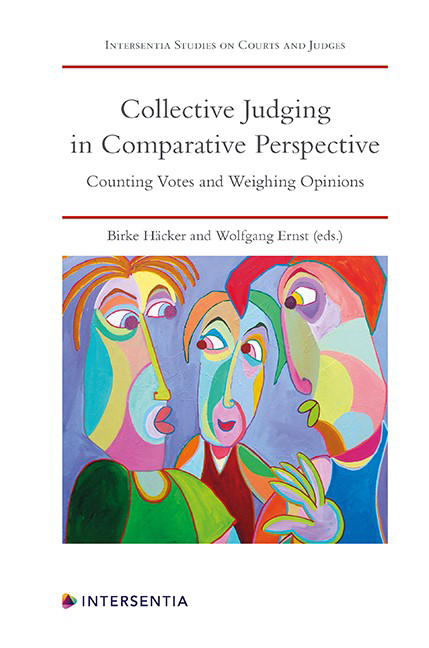Book contents
- Frontmatter
- Preface
- Contents
- List of Cases
- List of Contributors
- PART I DESIGNING COLLEGIATE COURTS’DECISION-MAKING PROCESSES
- PART II COLLEGIATE COURTS IN THE COMMON LAW TRADITION
- PART III COLLEGIATE COURTS IN THE EUROPEAN CIVIL LAW TRADITION
- PART IV COLLEGIATE COURTS IN A NON-EUROPEAN CIVIL LAW JURISDICTION: THE CASE OF JAPAN
- PART V SUPRANATIONAL AND INTERNATIONAL COLLEGIATE COURTS
- PART VI VOICES FROM THE AUDIENCE AND CLOSING REMARKS
- About the Editors
Chapter 10 - Decision-Making in Appellate Courts: An Austrian Experience
Published online by Cambridge University Press: 09 February 2021
- Frontmatter
- Preface
- Contents
- List of Cases
- List of Contributors
- PART I DESIGNING COLLEGIATE COURTS’DECISION-MAKING PROCESSES
- PART II COLLEGIATE COURTS IN THE COMMON LAW TRADITION
- PART III COLLEGIATE COURTS IN THE EUROPEAN CIVIL LAW TRADITION
- PART IV COLLEGIATE COURTS IN A NON-EUROPEAN CIVIL LAW JURISDICTION: THE CASE OF JAPAN
- PART V SUPRANATIONAL AND INTERNATIONAL COLLEGIATE COURTS
- PART VI VOICES FROM THE AUDIENCE AND CLOSING REMARKS
- About the Editors
Summary
INTRODUCTION
In this chapter, I am going to share with you a few observations on decision-making in Austrian courts. Before I do so, I should describe my own role and the nature of my involvement in the Austrian justice system. I can be described as a ‘professional hybrid’ because I am both a sitting judge and a law professor. Over the past 24 years, I have been sitting on many panels and tribunals of various sorts. While most of this work was as a judge of intermediate appellate courts, I have now been a member of the Austrian Supreme Court for some eleven years. Consequently, I will be talking mostly about the Austrian Supreme Court and, more specifically, about appellate decisions in civil cases. Criminal cases are different for a number of reasons, and the same holds true for intermediate appellate courts, where the smaller number of judges in a panel (normally three) and the workload often tends to reduce the time spent for deliberation and discussion.
Obviously, I am bound to observe the limits imposed by my professional duties of confidence. Therefore, regrettably I will not be able to disclose the actual course of deliberations in any specific case. Instead, I will confine myself to more general observations. All I am going to say is, in some form or another, available from public sources. While there is no equivalent to Kranenpohl's monumental study of the German Constitutional Court, in recent years some empirical work in this field has been done in Austria as well. I will rely heavily on papers published in a 2012 volume on access to the Austrian Supreme Court, which includes an article by myself on the working method of our Court, and on a book by sociologist Veronika Haberler which originated as a master's thesis I supervised and is based on interviews with some of the judges.
INSTITUTIONAL FRAMEWORK
THE AUSTRIAN COURT SYSTEM
Continental European court systems have been described as ‘bureaucratised’ by common law observers, and there is some truth to that (and I realise that the term ‘bureaucratised’ has a somewhat negative connotation). Certainly Austria, like most civil law countries, has a career judge system. This means that judges are typically appointed at an early age, after only a few years of training spent with various courts and other authorities such as public prosecutors.
- Type
- Chapter
- Information
- Collective Judging in Comparative PerspectiveCounting Votes and Weighing Opinions, pp. 195 - 204Publisher: IntersentiaPrint publication year: 2020



